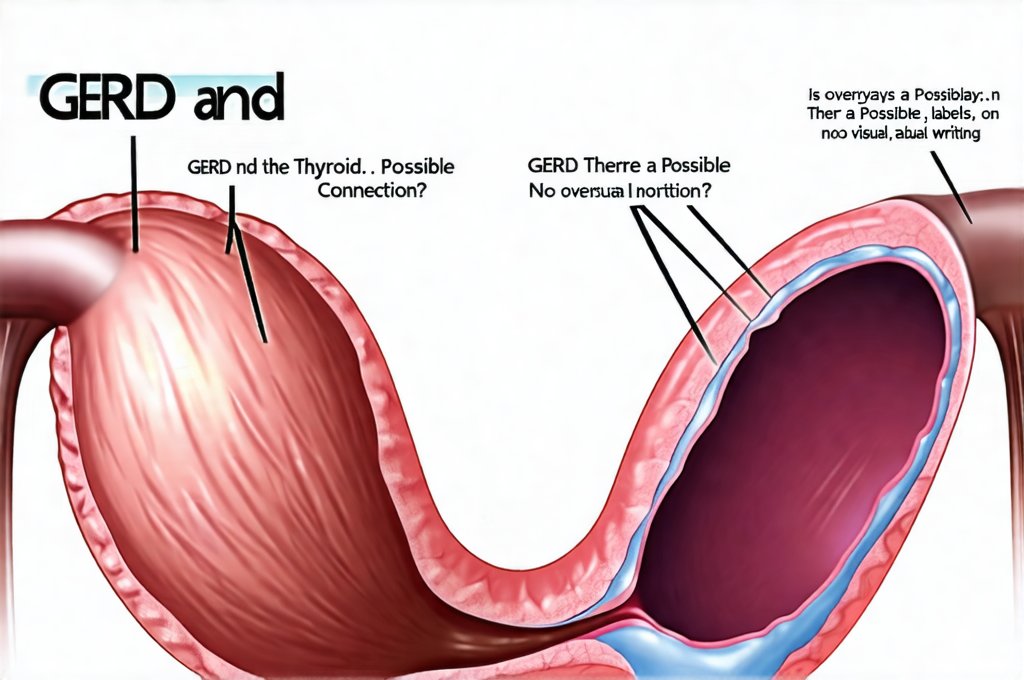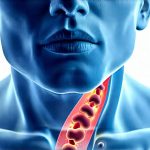Gastroesophageal reflux disease (GERD) is an incredibly common condition, affecting millions worldwide. Characterized by persistent heartburn, regurgitation, and sometimes more subtle symptoms like chronic cough or hoarseness, it impacts quality of life significantly for those who struggle with it. Often, individuals attribute these symptoms solely to dietary factors or stress, seeking relief through lifestyle changes or over-the-counter medications. However, the human body is a complex network, and seemingly unrelated systems can often influence one another in surprising ways. Increasingly, research suggests there’s a potential, bidirectional relationship between GERD and thyroid disorders – conditions that many people wouldn’t immediately associate with each other.
The connection isn’t always straightforward; it’s not as simple as saying one causes the other. Rather, shared risk factors, anatomical proximity, and physiological interactions can create scenarios where one condition exacerbates or even mimics symptoms of the other. Understanding this potential interplay is crucial for accurate diagnosis and effective treatment plans, ensuring individuals receive comprehensive care that addresses all contributing factors to their discomfort. This article will delve into the possible links between GERD and thyroid dysfunction, exploring how these conditions might influence each other, and what implications this has for patient management.
The Interplay Between Acid Reflux & Thyroid Function
The thyroid gland, responsible for regulating metabolism, sits in the front of the neck – a relatively close anatomical neighbor to the esophagus. This proximity is important because the esophagus passes near the thyroid, meaning inflammation or pressure from GERD could theoretically impact thyroid function, and conversely, an enlarged thyroid (as seen in some thyroid conditions) can put pressure on the esophagus, worsening reflux symptoms. The vagus nerve, a crucial cranial nerve involved in both digestive processes and thyroid hormone production, further complicates the relationship. Vagal nerve dysfunction can disrupt both esophageal motility (how food moves through the system) and thyroid hormone synthesis.
Beyond anatomical considerations, there’s growing evidence suggesting a link between autoimmune thyroid diseases – like Hashimoto’s thyroiditis and Graves’ disease – and increased risk of gastrointestinal issues, including GERD. Autoimmune conditions frequently cluster together; if someone is predisposed to one autoimmune disorder, they have a higher likelihood of developing others. This shared immunological component could explain why individuals with thyroid autoimmunity sometimes experience chronic digestive problems. Chronic inflammation plays a central role in both GERD and many thyroid disorders, creating a feedback loop where each condition can potentially worsen the other.
Finally, medications used to treat one condition can sometimes contribute to the other. For instance, some thyroid medications might have side effects that exacerbate GERD symptoms, while certain acid-reducing medications could interfere with thyroid hormone absorption if not taken at appropriate times. This highlights the importance of careful medication management and open communication between healthcare providers. You may also want to learn more about stomach and duodenal diseases for a better understanding of digestive health.
Thyroid Disorders Mimicking or Worsening GERD Symptoms
Many symptoms associated with thyroid dysfunction can closely resemble those of GERD, leading to misdiagnosis or delayed treatment. Hypothyroidism (underactive thyroid) often causes slowed digestion, which can contribute to constipation and a feeling of fullness, bloating, and even heartburn. Because food remains in the digestive system longer, there’s more opportunity for acid reflux to occur. Additionally, hypothyroidism can weaken the lower esophageal sphincter (LES), the muscle that prevents stomach acid from flowing back into the esophagus, making reflux more likely.
Hyperthyroidism (overactive thyroid), on the other hand, can accelerate digestion, leading to frequent bowel movements and potentially diarrhea. While it might seem counterintuitive, hyperthyroidism can also contribute to GERD symptoms. The increased metabolic rate associated with hyperthyroidism can put strain on the digestive system and increase abdominal pressure, promoting acid reflux. Furthermore, anxiety, a common symptom of hyperthyroidism, can worsen heartburn perception. It’s vital to recognize that these thyroid-related gastrointestinal issues aren’t necessarily caused by excess acid production; they often stem from altered digestive motility and increased intra-abdominal pressure.
It is essential for healthcare professionals to consider the possibility of underlying thyroid disease when evaluating patients presenting with chronic GERD symptoms, especially if those symptoms are atypical or don’t respond well to standard treatments. A thorough medical history, physical examination, and appropriate laboratory tests (specifically thyroid hormone levels) are crucial for accurate diagnosis. Understanding gut brain connection can also help understand the complex interplay between mind and body.
Investigating the Connection: Diagnostic Approaches
Diagnosing both GERD and underlying thyroid issues requires a multifaceted approach. For GERD, typical diagnostic tools include:
– Endoscopy: To visualize the esophagus and stomach for signs of inflammation or damage.
– Esophageal manometry: Measures esophageal pressure to assess LES function and motility.
– pH monitoring: Detects acid reflux episodes over an extended period.
However, when a potential thyroid connection is suspected, additional testing is needed. This includes:
– Thyroid hormone blood tests: TSH (thyroid stimulating hormone), T4 (thyroxine), and T3 (triiodothyronine) levels are essential to assess thyroid function. Sometimes, antibody tests (anti-TPO and anti-Tg antibodies) are performed to look for autoimmune thyroid disease.
– Thyroid ultrasound: Can help identify structural abnormalities or nodules in the thyroid gland.
It’s important to note that relying solely on symptoms can be misleading. Many GERD symptoms overlap with those of thyroid disorders, making accurate diagnosis challenging. Comprehensive testing is crucial to differentiate between the two conditions and identify any co-existing issues. If a patient has been diagnosed with GERD but isn’t responding to treatment as expected, or if they have unexplained digestive symptoms alongside signs of thyroid dysfunction (fatigue, weight changes, hair loss), further investigation into their thyroid health should be considered. Some patients may also benefit from knowing is there a test for leaky gut syndrome.
Managing the Overlap: Treatment Considerations
Treating patients with both GERD and thyroid disorders requires a personalized approach that addresses both conditions simultaneously. For GERD management, lifestyle modifications remain foundational:
1. Dietary adjustments (avoiding trigger foods like caffeine, alcohol, spicy foods)
2. Weight management
3. Elevating the head of the bed during sleep
4. Avoiding late-night meals
Medications such as proton pump inhibitors (PPIs) or H2 receptor antagonists may be prescribed to reduce acid production. However, it’s crucial to consider potential interactions with thyroid medications. For example, PPIs can sometimes interfere with iron absorption, which is important for thyroid hormone synthesis.
Simultaneously addressing the thyroid disorder is paramount. This might involve:
– Thyroid hormone replacement therapy for hypothyroidism (levothyroxine).
– Anti-thyroid medications, radioactive iodine treatment, or surgery for hyperthyroidism.
Close monitoring of both conditions and regular communication between gastroenterologists and endocrinologists are essential to ensure optimal patient outcomes. A holistic approach that considers the interconnectedness of these systems is key to providing effective and compassionate care. Understanding the connection between GERD and hiccups can also provide valuable insights into digestive health.
Future Research & Understanding
The relationship between GERD and thyroid disorders remains an area of ongoing research. While we’ve identified potential links, more studies are needed to fully elucidate the mechanisms involved and understand the prevalence of this co-occurrence. Investigating the role of the gut microbiome in both conditions could also provide valuable insights. The gut microbiome, a complex community of microorganisms living in our digestive tract, has been shown to influence immune function, inflammation, and even hormone regulation. Disruptions in the gut microbiome (dysbiosis) have been linked to both GERD and autoimmune thyroid diseases.
Furthermore, research is needed to determine how best to manage patients with co-existing conditions. Developing personalized treatment strategies that take into account individual risk factors, symptom profiles, and medication interactions will be crucial for improving patient outcomes. Continued investigation into this complex interplay between the digestive system and the thyroid gland promises to advance our understanding of these common yet often debilitating conditions and ultimately lead to more effective treatments. It’s also helpful to explore gut health and anxiety as it relates to overall wellbeing. Finally, consider the impact of timing when you ask best time to take probiotics.


















